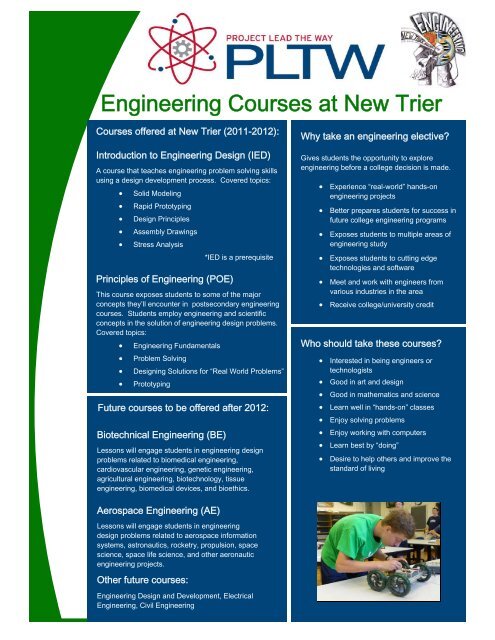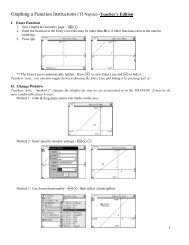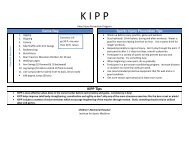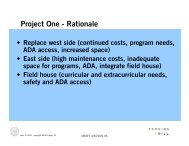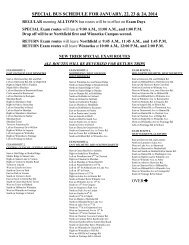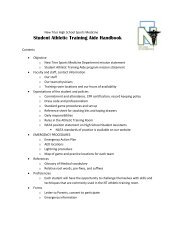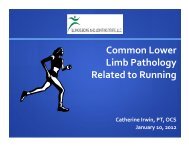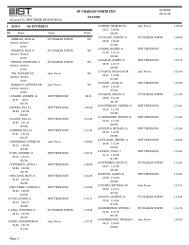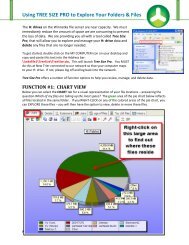Project Lead The Way Engineering Q and A - New Trier Township ...
Project Lead The Way Engineering Q and A - New Trier Township ...
Project Lead The Way Engineering Q and A - New Trier Township ...
You also want an ePaper? Increase the reach of your titles
YUMPU automatically turns print PDFs into web optimized ePapers that Google loves.
<strong>Engineering</strong> Courses at <strong>New</strong> <strong>Trier</strong><br />
Courses offered at <strong>New</strong> <strong>Trier</strong> (2011-2012):<br />
Introduction to <strong>Engineering</strong> Design (IED)<br />
A course that teaches engineering problem solving skills<br />
using a design development process. Covered topics:<br />
<br />
<br />
<br />
<br />
<br />
Solid Modeling<br />
Rapid Prototyping<br />
Design Principles<br />
Assembly Drawings<br />
Stress Analysis<br />
Principles of <strong>Engineering</strong> (POE)<br />
*IED is a prerequisite<br />
This course exposes students to some of the major<br />
concepts they’ll encounter in postsecondary engineering<br />
courses. Students employ engineering <strong>and</strong> scientific<br />
concepts in the solution of engineering design problems.<br />
Covered topics:<br />
<strong>Engineering</strong> Fundamentals<br />
Problem Solving<br />
Designing Solutions for “Real World Problems”<br />
Prototyping<br />
Future courses to be offered after 2012:<br />
Biotechnical <strong>Engineering</strong> (BE)<br />
Lessons will engage students in engineering design<br />
problems related to biomedical engineering,<br />
cardiovascular engineering, genetic engineering,<br />
agricultural engineering, biotechnology, tissue<br />
engineering, biomedical devices, <strong>and</strong> bioethics.<br />
Aerospace <strong>Engineering</strong> (AE)<br />
<br />
<br />
Why take an engineering elective?<br />
Gives students the opportunity to explore<br />
engineering before a college decision is made.<br />
Experience “real-world” h<strong>and</strong>s-on<br />
engineering projects<br />
Better prepares students for success in<br />
future college engineering programs<br />
Exposes students to multiple areas of<br />
engineering study<br />
Exposes students to cutting edge<br />
technologies <strong>and</strong> software<br />
Meet <strong>and</strong> work with engineers from<br />
various industries in the area<br />
Receive college/university credit<br />
Who should take these courses?<br />
Interested in being engineers or<br />
technologists<br />
Good in art <strong>and</strong> design<br />
Good in mathematics <strong>and</strong> science<br />
Learn well in “h<strong>and</strong>s-on” classes<br />
Enjoy solving problems<br />
Enjoy working with computers<br />
Learn best by “doing”<br />
Desire to help others <strong>and</strong> improve the<br />
st<strong>and</strong>ard of living<br />
Lessons will engage students in engineering<br />
design problems related to aerospace information<br />
systems, astronautics, rocketry, propulsion, space<br />
science, space life science, <strong>and</strong> other aeronautic<br />
engineering projects.<br />
Other future courses:<br />
<strong>Engineering</strong> Design <strong>and</strong> Development, Electrical<br />
<strong>Engineering</strong>, Civil <strong>Engineering</strong>
Facts <strong>and</strong> College Options:<br />
PLTW Facts:<br />
PLTW works. When surveyed, 80% of the<br />
high school seniors in the program<br />
indicated their primary area of study after<br />
high school would be in engineering,<br />
technology or computer science.<br />
PLTW helps influence <strong>and</strong> engage females<br />
in engineering. Female student<br />
participation in PLTW courses (17%)<br />
exceeds or is comparable to the fields of<br />
Mechanical (13.7%), Electrical (15%) <strong>and</strong><br />
Computer <strong>Engineering</strong> (12.1%), <strong>and</strong> in<br />
<strong>Engineering</strong> Technology (11.7%).<br />
In college, engineering majors have a high<br />
dropout/switch major percentage because<br />
students never experienced engineering in<br />
high school. 85% student retention rate in<br />
2nd year compared to 40% nationwide.<br />
Observations by independent entities have<br />
shown that PLTW increases student<br />
aptitude in STEM (Science, Technology,<br />
<strong>Engineering</strong> & Math) fields <strong>and</strong> increases<br />
retention rates in college engineering<br />
programs.<br />
University of Wisconsin-Madison suggests<br />
that students who take PLTW courses<br />
achieve higher test scores in non-STEM<br />
subject areas.<br />
PLTW alumni study engineering <strong>and</strong><br />
technology at 5 to 10 times the rate of non-<br />
PLTW students.<br />
PLTW students exceeded the average<br />
academic growth rate over one year of the<br />
virtual control group in science concepts<br />
<strong>and</strong> processes <strong>and</strong> mathematics. PLTW<br />
students also exceeded the average<br />
academic growth rate over one year of non-<br />
PLTW students in science concepts <strong>and</strong><br />
processes <strong>and</strong> mathematics. (2010 study)<br />
<strong>New</strong> <strong>Trier</strong> <strong>Project</strong> <strong>Lead</strong> the <strong>Way</strong> Course Sequence:<br />
Aerospace<br />
<strong>Engineering</strong><br />
College Options:<br />
Introduction to <strong>Engineering</strong> Design (IED)*<br />
Principles of <strong>Engineering</strong><br />
Biotechnical<br />
<strong>Engineering</strong><br />
Electrical<br />
<strong>Engineering</strong><br />
Option: With permission from the<br />
Department Chair, students may<br />
qualify to enroll in a specialized<br />
course after completion of IED.<br />
Specialized courses to be proposed during the next four years:<br />
Civil<br />
<strong>Engineering</strong><br />
Any <strong>Project</strong> <strong>Lead</strong> the <strong>Way</strong> course taken at <strong>New</strong> <strong>Trier</strong> will have a<br />
designated PLTW title listed on your transcript. Over 20 national affiliated<br />
colleges <strong>and</strong> universities administer PLTW. Students who earn a “B’<br />
average or higher in their PLTW course <strong>and</strong> pass a college credit exam<br />
(similar to an AP Exam) are eligible to register for college credit at<br />
participating schools.<br />
Some schools do not give direct college credit. However, they look for high<br />
school pre-engineering courses (PLTW) on a student’s application. <strong>The</strong>y<br />
also encourage students to discuss those courses/experiences in their<br />
essays.<br />
Currently there are over 1,300,000<br />
engineering jobs available in the U.S.<br />
without trained people to fill them.<br />
We need more engineers!


